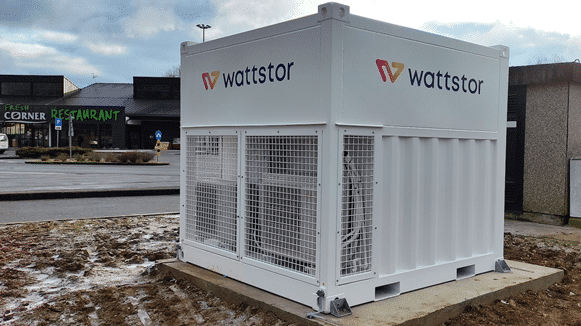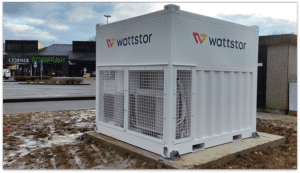| End User | HEP, Croatia |
|---|---|
| Industry | Public sector |
| Location | Kalovac County, HR |
| Assets on site | Podium EMS / Wattstor BESS / EV Charging / Solar PV |
| Battery (BESS) | 200kW / 432kWh |
| Time of delivery | 6 months |
Case Study: EV Charging site uses Wattstor EMS to avoid the need to increase their grid capacity
The Challenge
Wattstor partners with HEP, the Croatian national energy supplier to enable an EV charging site in Kalovac County to reduce demand peaks.
The Solution
There are 4x50kW EV charging hubs and 1x175kW Electric Vehicle chargers onsite, connected into one transformer station. Planned further expansion of EV charging on site would require an expensive strengthening of the grid connection.
Wattstor have supplied and commissioned a state-of-the-art Energy Management System (EMS) and a containerised Battery Storage System which supplements grid power and provides peak-shaving capability when demand exceeds pre-set values of allowed consumption from the grid.
As well as offering peak-shaving functionality Wattstor’s proprietary EMS can also optimise charging available according to customer requirements such as:
- First in, first out
- Priority to chosen charges
- Time based optimisation to take advantage of dynamic time of use energy tariffs
The use of Wattstor’s platform also means that the end user can integrate new generation, storage, operational load and further electric vehicle charging without needing to upgrade their EMS in the future.
The Results
Excitingly, this initial project is serving as a pilot study, and once it proves successful, it will expand to other service stations across the region.
The project was funded under the NEXT-E consortium, a unique cooperation of four leading companies from the electricity and oil & gas sectors joining forces with car manufacturers to create a interoperable and non-discriminatory EV charging network, as a viable alternative to combustion engine vehicles. The consortium consists of the following companies: E.ON Group, MOL Group, Hrvatska elektroprivreda in Croatia, PETROL (in Slovenia and Croatia), as well as Nissan and BMW.
A number of Croatian research institutes have also joined the project and will be collecting data from the site to learn more about EV charging behaviour and help inform the country’s future EV charging strategies.
Contact us if you would like to know more about how Wattstor can help your organisation deliver similar projects.
375kW
EV charging capacity
installed onsite
Up next...
Multi-Site EV Charging Rollout Support for National Highways
Contact us
If your commercial energy bills are too high but you have plenty of roof space, we could help you cut costs and carbon. Tell us more below
Contact us
If your commercial energy bills are too high but you have plenty of roof space, we could help you cut costs and carbon. Tell us more below
- +44 (0) 20 3868 5555
- [email protected]
- Wattstor Ltd, 21 Ironmonger Lane, London EC2V 8EY

